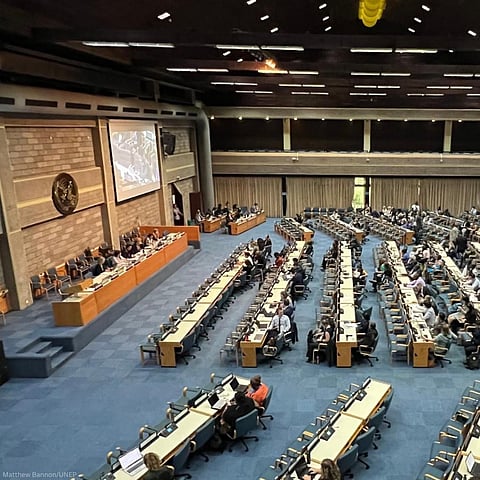Plastic-free planet: Third session of Intergovernmental Negotiating Committee begins in Nairobi
The third session of the Intergovernmental Negotiating Committee (INC-3) to develop an international legally binding instrument on plastic pollution began on November 11, 2023 with member states holding preparatory meetings, followed by a regional meeting on November 12, 2023. The session will go on until November 19, 2023 at the United Nations Environment Programme (UNEP) headquarters in Nairobi, Kenya.
The groundwork for this session was laid during the second meeting, where the INC secretariat was tasked with preparing the zero draft of the negotiation text and a synthesis report. The zero draft will serve as the foundation for discussions and negotiations in Nairobi during the third session, starting November 13, 2023.
Simultaneously, the synthesis report — a compilation of elements not covered in the second session, drawn from member states’ pre-written submissions for INC-3 — will also be taken into consideration. The synthesis report will help discuss issues such as the preamble, scope and definitions that were demanded by a handful of member states in the second meeting.
During the preparatory meeting, as co-facilitators invited interventions, Iran made a significant announcement: The formation of a Global Coalition for Plastics Sustainability. This coalition includes countries such as Iran, Saudi Arabia, the Russian Federation, Cuba, China, Bahrain, and potentially Brazil and India, although not explicitly mentioned during the intervention.
Chile’s delegation raised concerns about this announcement, highlighting the unexpected nature of an informal group making interventions when regional groups are scheduled to speak. The Global Coalition for Plastics Sustainability has positioned itself as the no-ambition counterpart to the High Ambition Coalition (HAC). The HAC, led by Norway and Rwanda, enjoys a semi-formal status acknowledged by the secretariat and civil society organisations.
India, for the first time since the negotiation process began, submitted a pre-meeting written statement, a noteworthy development. This indicates a significant shift, signifying the big polymer-producing country’s long-overdue acknowledgment and seriousness towards the negotiation process.
India’s numerous interventions during the preparatory meeting aligned with the Global Coalition for Plastics Sustainability’s objectives. Member states expressed differing opinions on the meeting’s focus — whether it should centre on substantive issues or intersessional work, including preamble, scope, and definitions.
A consensus on this matter did not emerge, possibly indicating a potential delay tactic reminiscent of the consensus versus voting issue that prolonged the INC-2 meeting in Paris for almost three days.
The secretariat faces the additional task of resolving the voting versus consensus debate by seeking clarity in the “interpretative text” introduced in the last meeting and ultimately adopting the rules of procedure in the third round of the meeting.
Currently, oil, gas and polymer-producing countries, predominantly from the West Asian region along with a few others like India, China, Russia and Brazil, have displayed resistance. They have taken positions advocating for a weaker treaty by rejecting upstream and midstream measures such as reducing primary plastic production, promoting reuse, and mainstreaming plastic alternatives.
It’s noteworthy that all these countries rank among the top 10 polymer-producing nations globally.
Several member states have referenced the application of the Common but Differentiated Responsibility (CBDR) principle. It’s ironic that the nations advocating for reduced responsibility are among the leading polymer producers. Despite their reluctance to curtail production, they insist on enhancing plastic waste treatment infrastructure to address the issue.
Experts argue that significant polymer-producing states should not be allowed to use the CBDR principle as a shield. Instead, funds should be directed exclusively towards Small Island Developing States and Least Developed Countries.
As negotiations unfold, the INC-3 session holds immense significance in shaping the global response to plastic pollution. The dynamics between formal and informal coalitions, differing national positions, and the delicate balance between ambition and realism will play pivotal roles in determining the outcome.
The diverse perspectives presented by member states underscore the complexity of finding common ground on critical issues, emphasising the importance of transparent and inclusive negotiations in addressing the pressing challenge of plastic pollution on a global scale.
Read more:
- Plastic-free planet: Evolution of Global Plastics Treaty
- Plastic-free planet: Negotiations on Global Plastics Treaty underway, the story so far
- Plastic-free planet: Recycling increases toxicity of plastics, warns Greenpeace study
- Plastic-free planet: Geopolitics slows progress on Day 1 of Paris meet
- Plastic-free planet: Members struggle to reach consensus on rules of procedure
- Plastic-free planet: Discussions on elements finally begin at Day 3 of Paris meet
- Plastic-free planet: Paris meet ends after severe delays, with proposal for zero draft text


